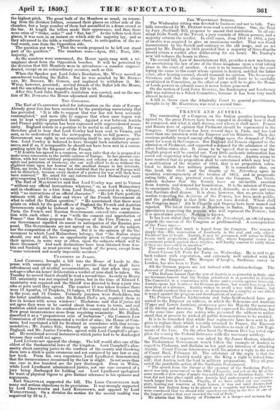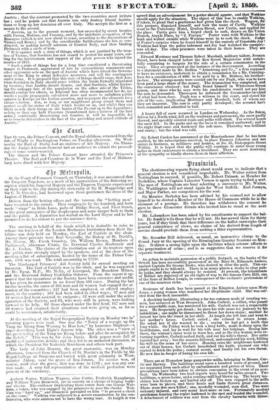FRANCE AND AUSTRIA.
The summoning of a Congress on the Italian question having been agreed to, the great Powers have been engaged in deciding how it shall be composed, and what it shall discuss, and where it shall meet. France and Russia were of opinion that Piedmont should be represented in tho Congress. Count Cavour has been several days in Paris, and has had more than one interview with the Emperor and his Ministers. Their dis- cussions probably turned among other things upon the demand of Pied.: mont for a seat in theCongress. But En-gland and Prussia objected to the admission of Piedmont, and supported a dend for the admission of the other Italian states also. It seems to beagreed that in some way the English project will be carried out. Very little authentic information has oozed out respecting what the Congress is to discuss. Austria seems VC have resolved that no proposition shall be entertained which may lend to a modification of the treaties of 1815, that is no proposition calcu- lated to disturb her military position. It is remarkable that, on this head, the Siiele and the Gaulle of St. Petersburg agree in speaking contemptuously of the treaties of 1815, and in prognosti- cating little, if any, practical result from the Congress. The Steele, indeed, declares that the French have an invincible aversion from Austria, and demand her humiliation. It is the mission of France to emancipate Italy. Austria, it is stated, demands, as a sine qua non, that Sardinia shall disarm. It is clear, however, that no precise infor- mation respecting the decisions of the Powers, has been made public, kiwi the probability is that little has yet been decided. Where shall the Congress meet.? Aix la Chapelle and Geneva have been named and rejected. The latest favourite is .,Manheim inRaden. There is much speculation respecting the persons who will represent the Powers ; but it is speculation purely. Nothipg is known. It has been Stated that the Gazette of St. Petersburgh, an official paper, regards the success of the Congress as problematical. A correspondent of the Times says- " I cannot say that much is hoped from the Congress. The reason is simply this—The annexation of Lombardy is tho real and only object Piedmont has at heart. Austria, it may be presumed, will refuse to listen to any such proposition ;,and Napoleon III.' whose Imperial crown is a permanent protest against these treaties, will hardly consent to ratify them if they are once called in question."
The same feeling is shared by others. Count Career left Paris for 'Turin on Wednesday. He is mid to go back radiant with expectation, and extremely well satisfied with his visit to the Emperor. The Marquis d'Azegl'o, Sardinian envoy in London, has also been to Paris.
All the German papers are not imbued with Austrian feelings. The Journal of Frankfort says-
" The Italians lament that the arm of Austria is so powerful in Italy, and we Germans lament that the Italian priesthood is so powerful in Austria. The Concordat is a convention with Home and a cordon against Germany. Austria opens her frontiers for German produce, but would fain keep Ger- man ideas at a distance. Austria wishes to avoid a war with France, but she should recollect that no war is so dangerous for a country as one which is waged against the progress and development of nations."
The Princes Charles Lichtenstein and Salm-Reifferscheid have pre- sented to the Emperor an address, in which the Bohemian and Austrian (Upper and Lower Austrian) aristocracy gave his Majesty the assurance of its fidelity and devotion. The Emperor expressed his satisfaction, but at the same time gave the nobles who presented the address to under- -stand that at present he wished all public demonstrations to be avoided.
It is to be remarked that while four regiments have been sent to Al- giers to replace those which recently returned to France, the Emperor has ordered the addition of a fourth battalion to each of the 100 Regi- ments of the Line. On the other hand the German Diet has voted sup- plies for arming the Federal fortresses with the necessary artillery.
Count Cavour, it appears, was asked by Sir James Hudson, whether the Piedmontese Government would follow the example of Austria in regard to Piedmont, and disclaim on her part any intention of attacking Austria. Count Career interweaves with his answer a reply to the note of Count Buol, February 25. The substance of the reply is that the aggressive acts of Austria would give the King a right to defend him- . self; that Austria took the lead in military preparations. They all pre- ceded the justifiable action of the Sardinian Government.
" The speech from the throne at the opening of the Sardinian Parlia- ment was only pronounced on the 10th of January, and yet on the 3d of the same month a new corps d'armee was suddenly sent to Austrian-Italy. Our loan did not take place until after Austria had endeavoured to negotiate a much larger loan in London, Finally, if we have called out our Contin- gent, leaving our reserves at their homes, it was not until Austria had -ordered her Italian Army to be placed on a complete war footing that we were convinced that we should find ourselves ere long in the face of one of the largest armies that ever crowded the soil of Italy."
He admits that the liberty of Piedmont is a danger and menace for Austria ; that the contrast presented by the two countries must irritate her ; and he points out that Austria can only destroy liberal institu- tions or keep up her dominion all over Italy. She accepts the first as a means to the second.
"Austria, up to the present moment, has succeeded by secret treaties with Parma, Modena, and Tuscany, and by the indefinite occupation of the Romagna (which is not now about to cease, according to the declarations of Vienna and Rome,) and by the considerable fortifications she has so con- structed, in making herself mistress of Central Italy, and thus binding Pi ed m on t with a circle of iron.
"It is against such a state of things, which is not justified by the trea- ties of Vienna, that Sardinia has not ceased to protest for many years, cal- ling for the intervention and support of the great powers who signed the treaties of 1815.
"Such a state of things has for a long time constituted a threatening danger to Piedmont, aggravated of late by extraordinary armaments and other aggressive acts on the part of Austria u hich have forced the (Jovern- ment of the King to adopt defensive measures, and call the contingents under alms. It is proposed that this state of things should cease, that Aus- trian dominion in Italy should enter within the limits formally stipulated by treaties ; that Austria should disarm, and that Sardinia, whilst deplor- ing the unhappy fate of the population on the other side of the Ticino, should confine her efforts, as England has often recommended her do, to- wards a pacific propaganda calculated more and more to enlighten public opinion in Europe on the Italian question, and to prepare the elements for a future solution. But, so long as our neighbours group round them and against us all the states of Italy which border on us, and whilst they can freely march their troops on the banks of the Po and up to the Appenmes ; so long as they can hold Piacenza (transformed into a fortress of the first order,) continually threatening our frontier, it will be impossible for as to remain defenceless in the face of the provoking and armed attitude of Austria."



























 Previous page
Previous page